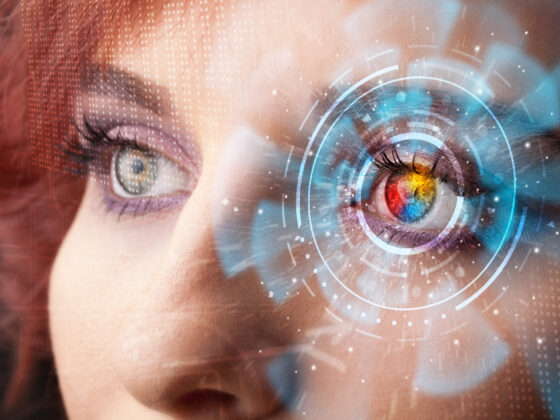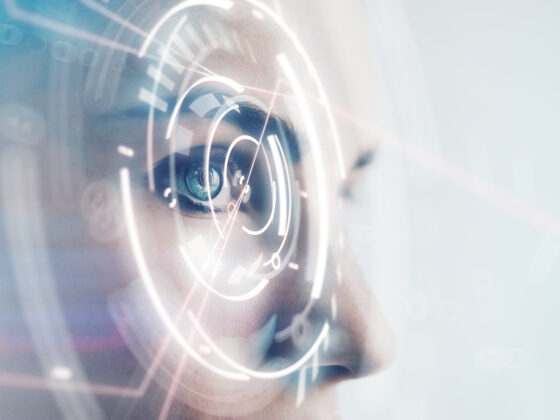Imagine our world as a giant petri dish and we are all inside of it. Experiments can be conducted on our “wetware.” There will be no escape from the drones.
While researching my piece, The Truth about Luciferase, I came across a patent that blew my mind and I absolutely had to write about it.
The patent is described as “Systems and Methods for Mobile Sample Collection” and it has to do with drones.
We’re talking armies of drones of all shapes and sizes, down to the smallest gnat, working together in a “swarm” to take samples, administer drugs and regulate the health and behavior of ordinary citizens. The promise is that these drones will be deployed to make our lives easier—for our health and safety.
Embarking on this read, I would like to start with some important words:
metaverse, meatverse, wetware, software, hardware
Metaverse: a virtual-reality space in which users can interact with a computer-generated environment and other users.
Meatverse: you will not find this word defined anywhere on the internet. It is the word technocrats derisively use when describing the real world.
In June 2018, Oculus executive Jason Rubin sent an email to Facebook board member Marc Andreessen with the subject line “The Metaverse.” This paper was like the first page in the history of a new world, written by one of the gods.
Ruben described the Metaverse as a place where users “float through a digital universe of virtual ads, filled with virtual goods that people buy. There would be virtual people that they marry, while spending as little time as possible in the so-called ‘MEATVERSE’ — referring to the real world because humans are flesh and blood.”
We are assured that at a certain point, humans will prefer spending time in the razzle-dazzle metaverse rather than the drab and restrictive meatverse. And lest you think, oh what’s the big deal, Zuckerberg’s metaverse is on the way out, it isn’t. If he isn’t successful, someone else will be—whatever form it takes over the next 10 years or so.
We are just pieces of meat to our controllers.
Wetware, Software, Hardware:
The human body is now being described in terms that are similar to robots, making us seem as if our differences are only technical. The human body and central nervous system are “wetware” as opposed to the “software” and “hardware” of machines.
Technopedia describes wetware like this:
…where neural networks and similar artificial intelligence technologies would be described as hardware, the human brain that they attempt to simulate and model would be the “wetware.” Biological systems are described as wetware because of the water that makes up so much of the biological tissue of humans, animals and plants. The term “wetware” will become increasingly useful as technology makes its way into the fields of biology and biological engineering.
We are wet. Machines are dry. We have temperatures—both emotionally and physically. Machines do not. Defining humans with these new words adjusts us to accepting identification based on similarity or dissimilarity to machines.
It’s hard to fight against our controllers if we don’t even know who or what to attack. The biosecurity state is all pervasive. There isn’t one government, organization, or person to point the finger at.

As of July 2022, the United States is just behind China in camera surveillance of its citizens, with an average of two cameras for every 10 people in its major cities. The UK is in third place with one CCTV camera for every 16 citizens in its larger cities.
Ever since 9/11, we have been programed to accept constant surveillance for our health and safety. The January 6th attack on the Capitol building opened the door for even greater surveillance due to increased risk of “domestic terrorism”. As for online surveillance, in 2019 alone, the US government investigated over 800,000 of its own citizens personal data.
Thanks to Covid, citizens came to accept greater and greater levels of control.
Drones have been working as police officers, soaring over the banks of the Seine in Paris and the city squares of Mumbai, to patrol for social distancing violators.
They’re delivering medical supplies in Rwanda and snacks in Virginia. They’re hovering over crowds in China to scan for fevers below.
“Yes auntie, this is the drone speaking to you,” said one drone, speaking to an elderly woman below in an eerie bullhorn echo, according to a video published by Global Times, a state-controlled newspaper. “You shouldn’t walk about without wearing a mask.”
Global Times also published an account of another drone. A voice from above castigated a small child peering skyward while seated with a man who was violating quarantine rules by playing mahjong in public: “Don’t look at the drone, child. Ask your father to leave immediately.”
Drones can be equipped with so-called stingrays to collect information from people’s mobile phones, night-vision cameras, GPS sensors, radar, lidar (laser detection technology for creating three-dimensional maps of an area), as well as thermal and infrared cameras.
Frank Wang is the world’s first drone billionaire. His company DJI, headquartered in Shenzhen, has a 77% share of America’s consumer drone sales, according to this Bloomberg article.
The same drone surveillance system being used in Xinjiang, a region in northwest China that human-rights groups have described as a police state because of the oppression, horrific abuse, and confining to camps of as many as 1 million Uighurs, are being used by Flymotion, a Florida-based drone services company that uses its devices to support dozens of police departments. “DJI owns the global market,” says Flymotion CEO Ryan English.
Agencies in all 50 states have drones now, about 90% of them made by DJI, according to a recent Bard College study.
Now that we have figured out ways to connect machines with our bodies, creating the Internet of Bodies (IoB), drones can be used as intermediaries between our machine-controlled bodies and the elite who control it all.
IoB means that our bodies are “connected to a network through devices that are ingested, implanted, or connected to the body in some way. Once connected, data can be exchanged, and the body and device can be remotely monitored and controlled”.
The elite will no longer have to walk among us. They can live in safe zones, real-world paradises, while we live under constant surveillance, our only escape being the virtual worlds inside our devices and perhaps one day connected directly to our minds.
At any time, drones can swoop down and take samples from us, or inject us with whatever drugs AI determines we need.
Such a skin-like device is being developed in a project between the U.S. Department of Energy’s (DOE) Argonne National Laboratory and the University of Chicago’s Pritzker School of Molecular Engineering (PME). Leading the project is Sihong Wang. According to Wang, “Such a diagnosis, with health information being continuously gathered over an extended period, is very data intensive.”

It should be noted that the Pritzker family, including Jennifer Pritzker (a male who identifies as transgender), “devotes their massive fortune to funding transgender ideology, or ‘synthetic sexual identities’ (SSI),” as described by journalist Jennifer Bilek.
Imagine a scenario where a drone, having evaluated you as being at risk of heart disease, implants a device on or in you that will monitor what you eat, when you eat, your heart rate, how often you exercise, how many hours you sleep. It will know if you commit the sin of smoking a cigarette or drinking a whiskey.
Perhaps AI will determine your son is really a girl. AI will know this, no matter if you say otherwise. It can administer drugs to facilitate your child’s “sex change.” What if as a result, you seem depressed or anxious? There are drugs for that, too.
One of the products being used to facilitate this is called stretchable electronics, a thin film of a plastic semiconductor combined with stretchable gold nanowire electrodes. You can see what it looks like in this short video. Research was funded by the U.S. Office of Naval Research, the National Science Foundation and a start-up fund from the University of Chicago.
Sub-millimeter microsensors tiny enough to inject under the skin is a step toward making tiny under-the-skin implants that continuously measure a person’s blood glucose, heart rate, and other physiological conditions a reality.
The small device, “approximately five centimeters square, can be placed directly on the skin for around-the-clock health monitoring. When the device turns color, the wearer knows something is awry.”
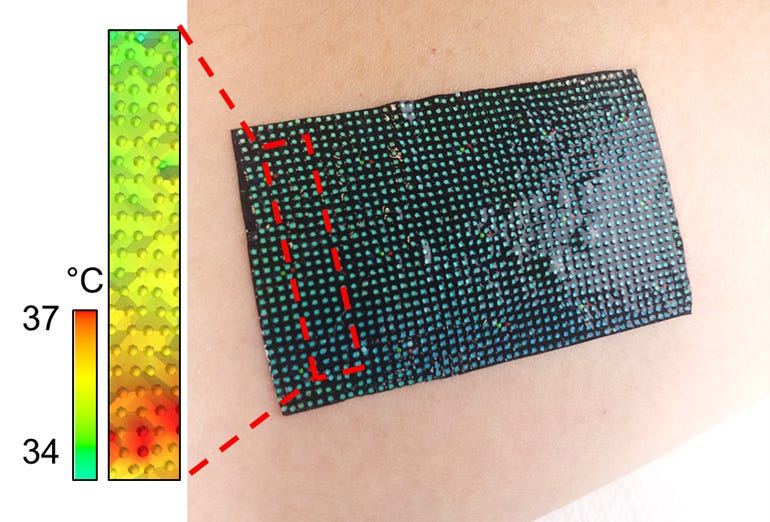
Other monitoring devices, according to Global Research are RFIDs:
RFID (radio-frequency identification) chips are implanted into a passport or driver’s license. RFID tags are small computer chips connected to miniature antennae that can be fixed to or implanted within physical objects, including human beings. The RFID chip itself contains an Electronic Product Code that can be “read” when a RFID reader emits a radio signal.
Hidden placement of tags. RFID tags can be embedded into/onto objects and documents without the knowledge of the individual who obtains those items.
Unique identifiers for all objects worldwide. The Electronic Product Code potentially enables every object on earth to have its own unique ID.
Massive data aggregation. RFID deployment requires the creation of massive databases containing unique tag data.
Hidden readers. Tags can be read from a distance, not restricted to line of sight, by readers that can be incorporated invisibly into nearly any environment where human beings or items congregate. RFID readers have already been experimentally embedded into floor tiles, woven into carpeting and floor mats, hidden in doorways, and seamlessly incorporated into retail shelving and counters, making it virtually impossible for a consumer to know when or if he or she was being “scanned.”
Individual tracking and profiling. If personal identity were linked with unique RFID tag numbers, individuals could be profiled and tracked without their knowledge or consent. (“Position Statement on the Use of RFID on Consumer Products,” Privacy Rights Clearinghouse, November 14, 2003)
The Association for Automatic Identification and Mobility touts (AIM)biometric identification as “an automated method of recognizing a person based on a physiological or behavioral characteristic.” This is especially important since “the need” for biometrics “can be found in federal, state and local governments, in the military, and in commercial applications.” When used as a stand-alone or in conjunction with RFID-chipped “smart cards” biometrics, according to the industry “are set to pervade nearly all aspects of the economy and our daily lives.”
Google is developing a device that can be implanted beneath a person’s skin in order to carry out diagnostic tests. The patent describes “a system for measuring and/or monitoring an analyte present in interstitial fluid in skin, capable of monitoring the blood and sweat of a wearer and transmit the results through an antenna to a companion device.”
But how will all of this be monitored? How will it be delivered? I did some digging into patents, and I found this one which the US government is implementing.
DOCUMENT ID: US 11517232 B1; Filed in 2015; DATE PUBLISHED: 2022-12-06; Inventor: Robertson Channing
I did find this explanation and the drawing, which illustrates the different types and sizes of drones (just so you all know it exists):
US 11,517,232 B1SYSTEMS AND METHODS FOR MOBILE SAMPLE COLLECTION Channing Robertson, Palo Alto, CA (US) Assigned to Labrador Diagnostics LLC, Wilmington, DE (US)Filed by Labrador Dlagnostics LLC, Wilmington, DE (US)Filed on Nov. 9, 2015, as Appl. No. 14/936,599.Claims priority of provisional application 62/077,023, filed on Nov. 7, 2014.Int. Cl. B64C 39/02 (2006.01); A61B 5/15 (2006.01); G05D 1/00 (2006.01); G08G 5/04 (2006.01)
CPC A61B 5/150748 (2013.01) [A61B 5/150847 (2013.01); B64C 39/024 (2013.01); G05D 1/00 (2013.01); G08G 5/04 (2013.01); B64C 2201/128 (2013.01); B64C 2201/141 (2013.01)]
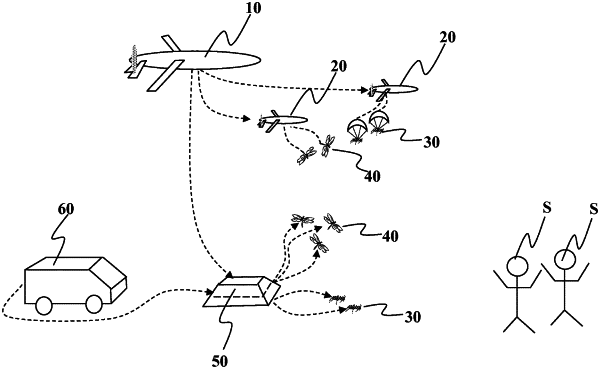
So, let’s look into Systems and Methods for Mobile Sample Collection.
The drones being employed are described like this in the patent:
A “drone” as used herein may be a mechanical device, electromechanical device, other self-propelled device, or a robotic device that can use one or more modes of transportation such as but not limited to flying, swimming, rolling, crawling, wheeling, and/or other movement mode to travel to a subject.
A drone may also have at least one other capability such as but not limited to video surveillance capability, audio surveillance capability, sample collection, tissue penetration, and/or other capabilities currently known or may be developed.
15) Optionally, some may test for a simple and/or rapid test initially; if a positive signal is detected, then the system may send more drones or send more sophisticated drones to the subject. Some may send a base station or other forward operating device to or near the location of the first drone to sample the area around that site.
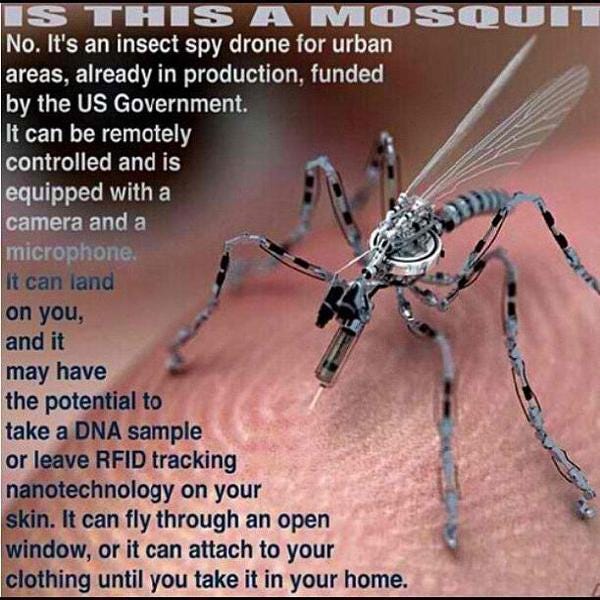
(16) Optionally, the size and weight of the drone may be such that they are less noticeable to the subject. This drives to a certain length scale, possibly smaller than a mosquito having the ability to talk to one another, talk to a base station, guidance, autopilot, etc. . . . ). i) Optionally, one configuration may be one where each small flying drone (“gnat”) takes the same type of sample. Optionally, one configuration may be one where ii) each “gnat” takes a different type of sample (blood, sweat, tears, or other bodily fluid). Optionally, one configuration may be one where iii) multiple “gnats” take different types of samples.
(21) In one non-limiting example, the nested drones or nested vehicles may be in the form of sisterships, motherships, daughterships, or any single or multiple combination of the foregoing.
(24) In one embodiment, the mobile sampling system may combine autonomous technology with one or more swarm technologies, one or more motive/movement technologies, and/or one or more sample acquisition technologies.
(33) Location acquisition (for targeting or retrieval) may be by one or more of the following: vision, magnetically, prior GPS coordinates, chemically, electrically, radar, sonar, GIS systems, mapping, and/or other targeting system. Some may use targeting based on features such as but not limited to gas output, thermal signature, CO.sub.2 output, scent-based characteristics, chemical, UV, anything in the EM spectrum, or other signature characteristic of the target.
Acquisition may involve waiting for subjects to walk by or be positioned for sampling. Some may involve being positioned on a tree branch, perch, overhang, or other location above the subject S. Tentacles, webs, strings, or attachments lines may be deployed to assist in getting the sampling device to the subject S. The device may acquire sample from a subject’s finger, hand, forearm, ear lobe, ear cheek, or buttocks.
(38) This reduced volume more enables the embodiments here to use tick or mosquito type sample acquisition techniques because the desired sample size is so small.
(46) Most occupants could be clearly detected by their airborne bacterial emissions, as well as their contribution to settled particles, within 1.5-4 h. It should be understood that an occupied space is microbially distinct from an unoccupied one, and that individuals release their own personalized microbial cloud.
(47) Optionally, other characteristics of the subject such as but no limited to height, weight, sex, profile, thermal image, picture, or the like may also be associated with the microbial cloud sample to more confidently confirm a target.
(51) Optionally, sampling theory and statistics is used as part of one implementation in terms of disease or other outbreak detection.
52) In one embodiment, the population to be sampled is one that has signed up to be sampled. An example may be all patients associated with a particular health insurance company, doctor group, medical group, or other affiliation (health-related or otherwise). Subjects may wear beacons, identifiers, other devices to help facilitate target acquisition by the sampling device. Some may wear Bluetooth, infrared transmitters, or other devices now known or to be developed in the future.
(53) In one non-limiting example, there is an option for sampling weekly, monthly, or other interval. In one non-limiting example, such sample collection may be occurring and the subject may not even know it.
(55) In one non-limiting example, a subject’s bodily fluid is being tested hourly or other frequent interval without the subject’s explicit knowledge.
(62) In one non-limiting example, the sample acquisition from a subject may be in a form that is based at least in part on bio-mimicry of tick, leech, mosquito, or other natural blood sampler for sampling purposes.
(66) Optionally, some may fly and land on a surface and then crawl to the subject. Some may land and remain in the shower or bathroom or other desired area to facilitate sample collection.
And that’s it! Unbelievable what they have in-store for us! I hope it won’t give you nightmares. If people still mock and say it will never happen, then I don’t know what to tell you. I’m doing my best to inform as many people as will listen–myself included.

A picture of the real world. My view as I write in Phoenix. No virtual reality can ever be better. We need to fight to keep it real and free of drones.
Thank you for listening and reading. God Bless!




